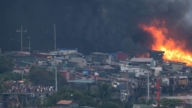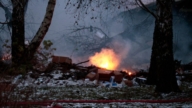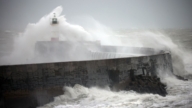【新唐人2011年12月24日訊】北韓共產領導人金正日去世後,官方媒體大造聲勢說,老百姓為他哭泣,連天地也為之動容,狂風暴雪,堅冰爆裂,靈鳥悲愴。然而這一切造神言論,被有過相同經歷的中國人視為荒唐可笑的騙人把戲。
金正日離世的這幾天,朝鮮官方媒體一直報導,老百姓如何為失去一位偉大的領導人而悲痛傷心。不過據《路透社》消息,這些人是被動員而上街哭泣的。
剛從朝鮮逃到韓國的人士反映,如果民眾不掉眼淚,會被人視為忠誠不足,因此不管怎麼樣,還得擠出一滴眼淚來。其實,很多人的感覺是,終於結束了,可以放鬆一些了。
大陸作家鐵流表示,凡是專制國家都會出現為獨裁者身亡而哭泣的虛假歷史,毛澤東去世的時候,他正在監獄遭受迫害,儘管他心裡很高興,也不得不戴上黑袖章。
大陸作家鐵流:「這就是歷史的假象,實際我心裡高興得不得了,覺得毛澤東一死了以後,中國的政治就會發生變化,所以當時9月9日,那天我寫了一首詩,這首詩可以代表現在的朝鮮人。『喜聞雪崩冰山倒,試看春水三分嬌,有歡不敢呈臉上,背立青紗亦嚎啕。』現在北朝鮮老百姓就這個心情,一個暴君死當然高興啦。」
鐵流說,他當時很想放聲大笑,但因為笑了會被加刑,甚至掉腦袋,他不得不放聲大哭。
《朝中社》報導說,在金正日死亡的上週六早上,被視為聖地的白頭山天池的堅冰破裂,響聲震耳慾聾,白頭山更刮起暴風雪,一只丹頂鶴週二晚上在咸興市的金日成銅像上空盤旋三週,在樹梢上低頭停留,十點多才向平壤方向飛去。
號稱「無神論」的共產黨,為甚麼在領導人離世時,總會說出一些神蹟呢﹖
中國歷史學專家李元華表示,在共產極權的國家,他們總是編造謊言來表明他們政權的合法性。
中國歷史學專家李元華:「 跟共產極權的本質有關,它就是靠騙來做事情的,他對統治下的百姓也是靠騙來維護的,只有這樣,他才覺得這個事情可信,在一個封閉的一個環境下,在百姓不了解真相的情況下,它能起到一定作用。」
原北京大學新聞與傳播學院副教授焦國標在《當年中國人怎樣哭毛》一文中,列舉了毛澤東去世時,很多真哭、假哭、傷心痛哭的例子。
李元華分析,部分老百姓在被矇蔽的狀態下,確實以為毛澤東一死,天就會塌下來。
李元華:「不了解真相的百姓也覺得,好像這個世界不能夠正常的運轉似的,過後他看了以後,實際上是一種可笑的舉動,有些人還真是由於在中共這種謊言的矇騙下,還真覺得世界末日要來了,世界上好像失去了一個偉大的神一樣,實際上是中共一手導演的,百姓被欺騙的情況下才發生這種事情。」
李元華還表示,民主國家的人可能看不懂為甚麼北韓獨裁者死了,老百姓會哭,有過類似經歷的中國人一眼就能看出其中的因由。
新唐人記者劉惠、周天採訪報導。
Communist Rule Deifies Kim Jong Il’s Death
Since communist leader Kim Jong Il’s death,
North Korea’s official media has alleged in high-profile that
Kim was mourned in a mass outpouring of grief.
Even heaven and the earth were touched by snowstorms,
ice cracking, and even birds were sorrowful.
However, Chinese people who went through
a similar history view it all as ridiculous lies.
In the past few days since Kim Jong Il’s death, the North Korean
official media has kept up reporting on domestic mass grief.
However, Reuters has said that people were mobilized to
weep in the street.
Some North Koreans who just fled to South Korea
have revealed the inside story.
Those North Koreans who do not weep are viewed as not loyal
to the state leader.
So the people have to shed tears regardless.
However, many citizens actually feel that now Kim’s life
has finally ended, they can get relax a little bit.
Chinese Writer Tie Liu says, that the scene of weeping for
a dictator’s death is commonly seen in any authoritarian state, it is a pretence.
Tie Liu reveals that he was in jail when hearing of Mao’s death.
Although he was very happy, he had to wear black armbands in morning.
Chinese Writer Tie Liu says: “This was just pretence
in China’s history.
“Actually I was really happy then, for I believed that
after Mao’s death, China’s politics would change”.
The day was September 9 that I wrote a poem,
which can represent the current emotion inside North Korea.
『Rejoicing at the news of the top’s collapse,
Enjoying the charming sight of the spring water
Putting joy inside my heart away from my face,
Showing my wail even leaving the mourning hall.
That’s the true mood of the current North Korean people,
a tyrant’s death is of course a happy thing for them."
Tie Liu says at that time he eagerly wanted to laugh aloud.
However, he knew that a laugh would bring a longer jail term,
or even an execution, so he had to burst into tears instead.
According to Korean Central News Agency reports,
on the morning of the day of Kim Jong Il’s death,
the ice on Heaven’s Lake on sacred Mount Baekdu cracked,
with a deafening roar.
While on Mount Baekdu there was a snowstorm blowing.
On the night of December 20, a crane circled a statue of
Kim Jong-Il in Hamhung city three times.
The bird stayed at the top of a tree lowering its head,
and then flew in the direction of Pyongyang at around 10pm.
Professing itself as “atheist “, the Communist Party always
reports miracles for its leaders’ deaths. But why?
Expert on Chinese history, Li Yuanhua, gives an explanation.
In communist totalitarian countries, the ruler always
makes up lies to prove the regimes’ legitimacy.
Li Yuanhua says: “This is related to the essence of
totalitarian communism.
The regimes have long cheated the population to
maintain their rule.
Only by doing things this way, can the ruler feel confidence.
In a sealed-off environment,
when the people are deprived of the truth, this practice can help.”
Former associate professor in Journalism at Peking University,
Jiao Guobiao, wrote an article, entitled “How the Chinese cried on Mao’s death".
Jiao cited many examples of genuine grief, weeping
and heart-broken wailing.
Li Yuanhua says that part of the population really feared that
the sky would fall down on Mao’s death.
Li Yuanhua: “Those who didn’t know the truth also felt
that the world wouldn’t go on without Mao.
But later they became aware of how ridiculous that was.
Due to the CCP’s restless propaganda and lies, some people
really thought the last day had come and that the world had lost a great god.
In fact it was just a show directed by the CCP,
the population was deceived.”
Li Yuanhua also says, that people living in democratic
countries may not understand
why the North Koreans cry so sadly for the death of a dictator.
However, the Chinese people who suffered similar experiences
can see the actual cause behind it.
NTD reporters Liu Hui and Zhou Tian




























